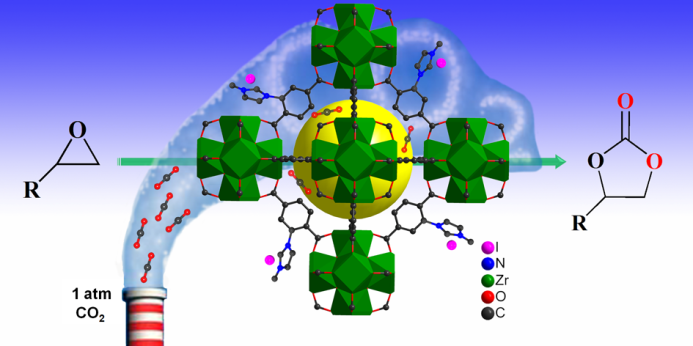
The capture and chemical fixation of carbon dioxide (CO2) into value-added chemicals with high efficiency represents a great challenge for humankind. It is critical for CO2 to be recycled to reduce the content of CO2 in atmosphere and attain clean energy. This process is usually carried out in the presence of co-catalysts or under high pressure conditions, which are uneconomical and energy-intensive.
Metal-organic frameworks (MOFs) are particularly attractive adsorbents for CO2 for their easy accessibility, ultrahigh porosity and tunable functionalities. However, most of reported MOFs lack efficient catalytic active sites for sustainable CO2 conversion and need co-catalysts.
Prof. CAO Rong and his colleagues from Fujian Institute of Research on the Structure of Matter, Chinese Academy of Sciences, have designed and synthesized a bifunctional imidazolium functionalized Zr-MOF via isoreticular synthesis and a post-synthetic modication (PSM) method.
Eventually, they found that without addition of co-catalyst, the resulted porous ionic Zr-MOF (2) containing Brønsted-acid sites and iodide ions exhibited excellent catalytic activity and recyclability for cycloaddition of CO2 with epoxides at ambient pressure. This study was published in Chemical Sicence.
Other imidazolium-derived porous materials, such as poly-ionic organic networks (PIONs), are also good catalysts for CO2 adsorption and transformation, but the preparation of them usually need organic or inorganic templates to endow them with porosity.
The results in this paper suggest that multifunctional catalytic sites can be well arranged in a highly ordered manner in MOFs, and thus they can conduct synergistic catalysis. Therefore, the preparation of MOF (2) may provide insights for the design of more efficient MOFs catalyst.
This research is supported by the grants from the Chinese Academy of Sciences, the 973 Program and the National Natural Science Foundation of China, Youth Innovation Promotion Association, CAS.

Chemical fixation of carbon dioxide by microporous ionic MOF (Image by Prof. CAO's Group)

86-10-68597521 (day)
86-10-68597289 (night)

52 Sanlihe Rd., Xicheng District,
Beijing, China (100864)

